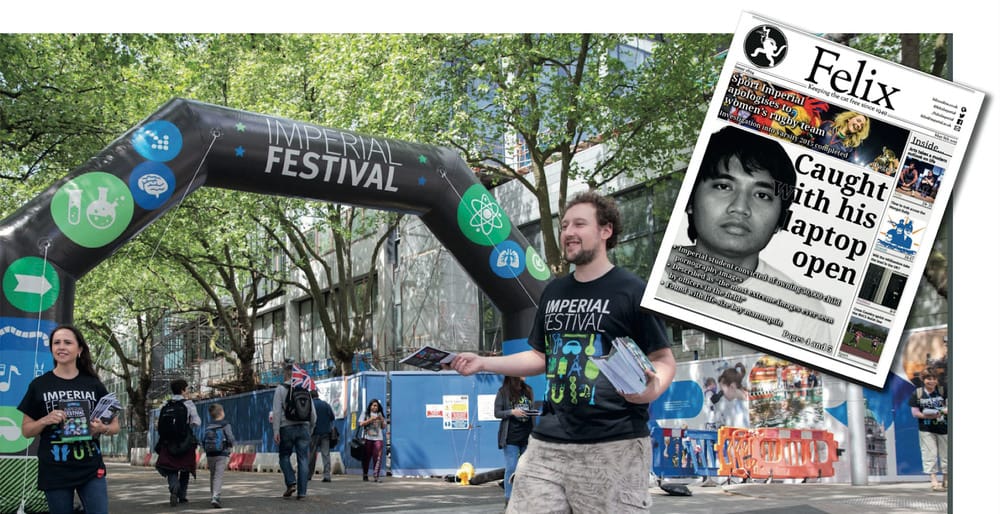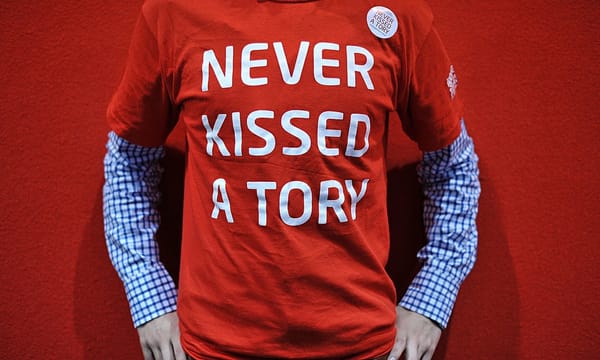On continuing to Keep The Cat Free
Cecily Johnson doesn’t want to set a precedent for the censorship of student media

Last weekend, the College played host to 15,000 guests at this year’s Imperial Festival. With alumni events running alongside, the festival seeks to raise Imperial’s profile by dragging its scientists and engineers out of the laboratory to share their research with the public. But this year, one regular campus fixture wasn’t being presented to the ImpFest audience: the student newspaper, Felix.
Unfortunately, our front cover last week featured the story of Nur Fitri Azmeer Nordin, a former third year mathematics student who was recently convicted of making and distributing child pornography. Subsequently, the Imperial College Communications and Public Affairs division (Comms) made the decision to remove all copies of Felix from public access for the duration of the festival, after we’d already distributed the paper around campus.
The Felix team was able to compromise and move some Felix distribution bins inside the Central Library in the hope that some students would still be able to access the paper. However, against our wishes, Imperial Estates Facilities employees were sent to remove the papers before the end of the day, meaning that large numbers of students leaving lectures, labs and tutorials after this time were unable to access copies of Felix.
When initially informing Felix of their decision, Comms indicated that they did not think our front cover was suitable for children; they later cited fears that they might receive complaints from parents attending the festival if the papers remained accessible. However, it is my feeling that there was nothing on the cover that children couldn’t potentially see any time they walk past a newsagents or glance at a television showing the evening news.
Since the limited distribution was announced, the question of whether it amounts to censorship has been a hot topic in the Felix office. A quick Google tells us that the definition of censorship is “the suppression of speech, public communication or other information which may be considered harmful, sensitive ... or inconvenient, as determined by governments ... authorities or other groups or institutions”. College’s action to restrict Felix’s distribution channels certainly falls within this remit, in my opinion.
Even among our own ranks, there was a wide range of reactions to Comms’ decision. There was universal sympathy for the position that College were put in: a campus decorated with the phrase “extreme child pornography” at the same time as it was being flooded with young visitors (and their parents). However, there was a lot of anger and frustration at the way they responded. Many of us felt that it was overkill to remove Felix distribution bins from areas of campus that were not hosting Festival talks, booths and events.
The clearly designated festival entrance was on Imperial College Road, and the vast majority of visitors would likely not stray further than the Queen’s Lawn, Sir Alexander Fleming Building or the Sherfield Building. Despite this, our distribution bins were also removed from the Business School entrance and City and Guilds Building, areas not directly involved in the festival but visited mostly by our regular Felix audience.
I am by no means accusing College of attempting to silence this story altogether. There was no attempt to restrict access to the online version of the article, and some students were still able to get hold of physical copies of Felix from the bins we put in the library and in Beit Quad. However, withdrawing distribution from our most high-traffic areas so early on a Friday afternoon directly resulted in readers not being able to access the paper that a team of around 50 students put hundreds of collective man-hours into producing.
College’s intention may not have been to restrict Felix’s content from its normal audience, but they inadvertently did, and their action also kept Felix out of the path of prospective students and alumni. Felix contributors attending ImpFest have relayed stories of alumni asking festival volunteers what had happened to Felix and why it was missing from campus. If Comms had voiced concerns about the story sooner, we might have been able to work with organisers to make copies available on request.
I picked up my first issue of Felix while attending an Imperial open day as a prospective student, and it was this that inspired me to seek out the team during Freshers’ Fair last October and get involved. While Felix is a newspaper made by students, I don’t think it is necessarily only for students. We count many members of the College and Union staff amongst our readership, and our online presence enables us to reach alumni and non-Imperialites too. It saddens me to see our distribution restricted from any audience.
Felix is in a unique position among student publications in the UK in that we have independent editorial control over all our content. We are very fortunate — and proud — not to have to send our paper to anyone at the College or the Union for review before going to print each week. However, of our own volition we frequently work with Comms and the Union where appropriate to lend insight and balance to our articles.
The phrase “Keep The Cat Free”, first adopted as Felix’s motto in 1974, has always represented both the cost of the paper and its tradition of free speech. There have been attempts to infringe on this freedom in the past — some of them successful — and it is vital that we publicly recognise and consider the consequences of such actions. We must not allow a precedent to be set for College to squirrel student media away from the public view whenever they take a disliking to our content.
In a world where our own government is seeking to introduce wide-ranging powers to ban citizens from broadcasting and require them to submit communications for ‘approval’ before circulation, it is more important than ever for us to be aware of matters of free speech. Moving a few distribution bins out of public view is not a great transgression, but it is pawing at the boundary of censorship and — to my mind — that is a very dangerous thing indeed.








